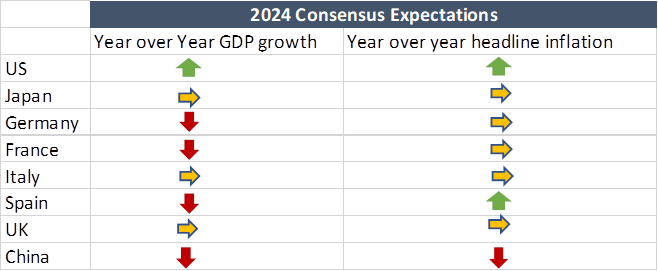What 2024 will be like for the USA, China, Japan, Germany and France

Facts, numbers and scenarios for the economies of the USA, China, Japan, Germany and France. Analysis by William Davies, Global Chief Investment Officer of Columbia Threadneedle Investments
2023 provided better economic data than expected: inflation decreased, employment held up well and the risk of a recession was averted, thanks also to resilient growth. In light of this positive scenario, the US Federal Reverse, together with other central banks, has opted to keep rates higher for longer. Right now, the market is driven by uncertainties about the timing of a possible rate cut and the extent of an economic slowdown. Below are our reflections in view of 2024.
The geopolitical risks could outweigh the economic ones
While the economic slowdown has not yet occurred, we at Columbia Threadneedle believe this will not have a significantly negative impact. We know in depth the risks deriving from a gradual increase or decrease in inflation, as well as those of a more or less deep recession.
However, we believe that the most significant threats in 2024 will be geopolitical in nature, given the short-term volatility and the inflationary pressures these could generate over the longer term. Companies would suffer the most, as identifying alternative energy supplies or developing new supply chains involves particularly high costs. Among the most important geopolitical risks are the escalation of conflict in the Middle East and the worsening of tensions between the United States and China. Added to these is the unknown relating to the US elections, whose effect on the markets remains unpredictable.
Opportunity in uncertainty
Looking ahead to the new year, investors will need to find the right balance between optimism about the global economy and the many surrounding uncertainties. When it comes to bonds, US government bonds, medium to long term, and corporate bonds with investment grade ratings are a good choice, as they offer solid rates of return. And high-yield bonds, with near-double-digit yields, are also an attractive option.
Clearly, investment choices will generally depend on the outlook for economic performance and risk appetite. Regarding stocks, we believe it is useful to broaden our gaze beyond the small group of companies that dominated the market in 2023. The performance of the stock market should in fact improve and the areas that have not shown the rallies achieved by the stronger sectors could offer interesting opportunities.
Return of differentiation on the markets
During and in the aftermath of the Covid-19 pandemic, central banks and fiscal policies pursued the same goal, albeit with different strategies: to stabilize economies. Over the course of 2023, we have seen a gradual differentiation with respect to policy benefits and economic outcomes; a divergence that could become even more pronounced in 2024 (see Figure 1).

For example, the Fed could keep rates higher for longer than the Bank of England, taking into account the structure of the English economy, characterized by shorter-term mortgage lending and greater overall vulnerability to rising rates. The Eurozone managed to avoid recession in 2023, thanks also to a mild winter which allowed energy costs to be kept low despite the loss of Russian supplies. The same could happen in 2024 too.
Furthermore, gaps between economies are also widening in terms of valuations. Currently, at 18 times forward earnings, US stocks are much more expensive than European (12 times) and Japanese (14 times) stocks. However, we believe that evaluation alone cannot justify a regional bet in the immediate future, although it is evidence of the growing differentiation between markets and could in this sense be a harbinger of new opportunities.
Longer timescales for the energy transition
In light of slowing economic growth, the implementation of energy transition programs may slow down and some commitments may fall through the cracks, as we have seen happen in the UK. While confirming our willingness to respect the commitments made on this front, it must be considered that in a weaker economic context it will probably be necessary to find the right balance between these efforts and other economic and budgetary priorities.
Bottom line: Opportunity ahead of slowdown
Currently, the state of the economy is characterized by moderate or slowing growth, declining inflation and high interest rates. Some believe a deeper recession is possible due to the persistence of high rates, while others foresee an inflationary rise linked to the continued strengthening of the economy, production cuts by OPEC or even the impact of war. In our opinion, we believe that an intermediate scenario is likely to occur in the next six months.
This is a machine translation from Italian language of a post published on Start Magazine at the URL https://www.startmag.it/economia/economie-usa-cina-giappone-germania-francia-2024/ on Sun, 26 Nov 2023 06:00:04 +0000.
